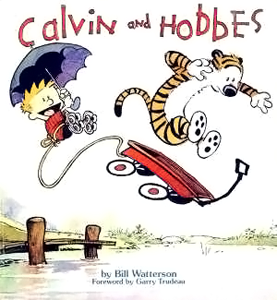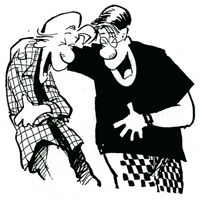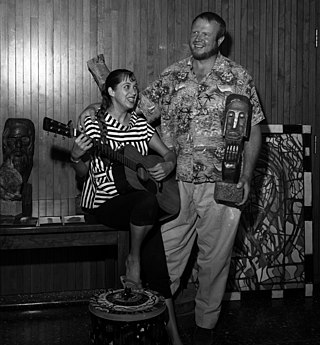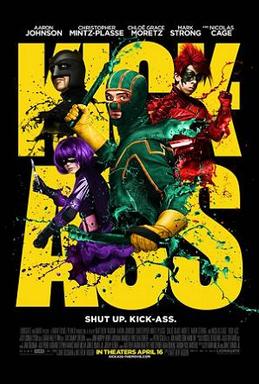Related Research Articles

Calvin and Hobbes is a daily American comic strip created by cartoonist Bill Watterson that was syndicated from November 18, 1985, to December 31, 1995. Commonly cited as "the last great newspaper comic", Calvin and Hobbes has enjoyed broad and enduring popularity, influence, and academic and philosophical interest.

Robert Dennis Crumb is an American cartoonist who often signs his work R. Crumb. His work displays a nostalgia for American folk culture of the late 19th and early 20th centuries, and satire of contemporary American culture.

Comics is a medium used to express ideas with images, often combined with text or other visual information. It typically takes the form of a sequence of panels of images. Textual devices such as speech balloons, captions, and onomatopoeia can indicate dialogue, narration, sound effects, or other information. There is no consensus amongst theorists and historians on a definition of comics; some emphasize the combination of images and text, some sequentiality or other image relations, and others historical aspects such as mass reproduction or the use of recurring characters. Cartooning and other forms of illustration are the most common image-making means in comics; fumetti is a form that uses photographic images. Common forms include comic strips, editorial and gag cartoons, and comic books. Since the late 20th century, bound volumes such as graphic novels, comic albums, and tankōbon have become increasingly common, while online webcomics have proliferated in the 21st century.

Little Orphan Annie is a daily American comic strip created by Harold Gray and syndicated by the Tribune Media Services. The strip took its name from the 1885 poem "Little Orphant Annie" by James Whitcomb Riley, and it made its debut on August 5, 1924, in the New York Daily News.

Mutt and Jeff was a long-running and widely popular American newspaper comic strip created by cartoonist Bud Fisher in 1907 about "two mismatched tinhorns". It is commonly regarded as the first daily comic strip. The concept of a newspaper strip featuring recurring characters in multiple panels on a six-day-a-week schedule had previously been pioneered through the short-lived A. Piker Clerk by Clare Briggs, but it was Mutt and Jeff as the first successful daily comic strip that staked out the direction of the future trend.

Blondie is an American comic strip created by cartoonist Chic Young. The comic strip is distributed by King Features Syndicate, and has been published in newspapers since September 8, 1930. The success of the strip, which features the eponymous blonde and her sandwich-loving husband, led to the long-running Blondie film series (1938–1950) and the popular Blondie radio program (1939–1950).

Zits is a comic strip written by cartoonist Jerry Scott and illustrated by Jim Borgman about the life of Jeremy Duncan, a 17-year-old high school junior. The comic debuted in July 1997 in over 200 newspapers and has since become popular worldwide and received multiple awards. As of 2010, it continues to be syndicated by King Features and is now included in "more than 1,700 newspapers worldwide in 45 countries and is translated into 15 different languages."
Big Daddy may refer to:

Little Annie Fanny is a comics series by Harvey Kurtzman and Will Elder. It appeared in 107 two- to seven-page episodes in Playboy magazine from October 1962 to September 1988. Little Annie Fanny is a humorous satire of contemporary American society and its sexual mores. Annie Fanny, the title character, is a statuesque, buxom young blonde woman who innocently finds herself nude in every episode. The series is notable for its painted, luminous color artwork and for being the first full-scale, multi-page comics feature in a major American publication.

The hungry i was a nightclub in San Francisco, California, originally located in the North Beach neighborhood. It played a major role in the history of stand-up comedy in the United States. It was launched by Eric "Big Daddy" Nord, who sold it to Enrico Banducci in 1951. The club moved to Ghirardelli Square in 1967 and operated mostly as a rock music venue until it closed in 1970.
Christopher Kelly Browne was an American comic strip artist and cartoonist. He was the son of cartoonist Dik Browne and brother of cartoonist Chance Browne. From 1989 to 2023, Browne wrote and drew the comic strip Hägar the Horrible, which is distributed by King Features Syndicate.

"Oye Mi Canto" is a reggaeton single by N.O.R.E. The song was originally released in 2004 as the lead single from the album 1 Fan a Day, which was heretofore unreleased. It is his second biggest hit, peaking at number 12 on the Billboard Hot 100. It was later included on the 2006 album N.O.R.E. y la Familia...Ya Tú Sabe. The song features Nina Sky and reggaeton artists Gem Star, Daddy Yankee and Big Mato. The song originally featured Tego Calderón in place of Daddy Yankee but was later changed for the video. However, the Tego version was released by famous reggaeton label Planet Records Italy, instead of Island Def Jam, N.O.R.E.'s original label. It's N.O.R.E.'s first venture into the increasingly popular Latin genre reggaeton.
GoComics is a website launched in 2005 by the digital entertainment provider Uclick. It was originally created as a distribution portal for comic strips on mobile phones, but in 2006, the site was redesigned and expanded to include online strips and cartoons. GoComics publishes editorial cartoons, mobile content, and daily comics. It is currently owned by Andrews McMeel Universal.
Daddy's Home may refer to:
Daddy's Home is a daily comic strip which premiered in American newspapers on March 10, 2008, and is syndicated by Creators Syndicate. The strip can currently be seen in large market newspapers such as the Orange County Register. The strip is written by Tony Rubino and illustrated by Gary Markstein, a features designer with the Milwaukee Journal Sentinel.

Kick-Ass is a 2010 black comedy superhero film directed by Matthew Vaughn from a screenplay by Jane Goldman and Vaughn. It is based on the comic book of the same name by Mark Millar and John Romita, Jr.
Robert Duncan Low was a Scottish comics writer and editor. Employed by D. C. Thomson & Co., he was responsible for their line of comics, and, as a writer, co-created Oor Wullie and The Broons with artist Dudley D. Watkins.
Duncan Scott was a comics artist. He had been working freelance since completing a degree in visual communication in 1999. He has drawn for numerous comics and magazines and his work has appeared in The Beano, The National times, Blue Peter magazine, Disney Explorer magazine, BBC's Learning Is Fun magazine, BeanoMAX, The Dandy and Comic Football.
Canadian comics refers to comics and cartooning by citizens of Canada or permanent residents of Canada regardless of residence. Canada has two official languages, and distinct comics cultures have developed in English and French Canada. The English tends to follow American trends, and the French, Franco-Belgian ones, with little crossover between the two cultures. Canadian comics run the gamut of comics forms, including editorial cartooning, comic strips, comic books, graphic novels, and webcomics, and are published in newspapers, magazines, books, and online. They have received attention in international comics communities and have received support from the federal and provincial governments, including grants from the Canada Council for the Arts. There are comics publishers throughout the country, as well as large small press, self-publishing, and minicomics communities.
Comics has developed specialized terminology. Some several attempts have been made to formalize and define the terminology of comics by authors such as Will Eisner, Scott McCloud, R. C. Harvey and Dylan Horrocks. Much of the terminology in English is under dispute, so this page will list and describe the most common terms used in comics.
References
- ↑ Astor, Dave (January 5, 2005). "'Raising Duncan' Comic Ends". AllBusiness. Retrieved February 15, 2009.